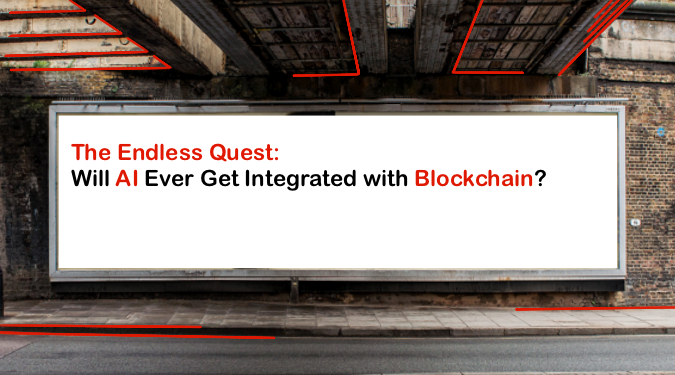The Endless Quest: Will AI Ever Get Integrated with Blockchain?

Over the past decade, there have been two technological sectors that have generated more buzz than any of the others, two fields of development and burgeoning industries that have been singled out as the greatest potential catalysts for the ways in which we live and work. Those two sectors are blockchain technology and artificial intelligence.
With artificial intelligence, it is fairly understandable why it is regarded as an industry capable of transforming multiple aspects of modern life. Long the happy hunting ground for science fiction films and writers, AI is so intriguing because no one really knows what the ceiling could be in terms of what AI could be capable of. In addition to that, the development of AI—however it plays out—will have a great impact on the way we see ourselves, on what it means to be a human, on what we deem to be our unique qualities and capabilities.
With blockchain, it is perhaps less obvious for those who are not in the industry why it is regarded as one of the great potential agents of change at play today. Of course, the profile of blockchain has skyrocketed due in large part to the popularity of cryptocurrency. But there is much more to blockchain technology than digital assets. The decentralized paradigm that has been flourishing in tandem with the development of the industry is something that has never been implemented before on a similar scale. Thanks to blockchain technology, we can set up systems and organizations that are run collectively via connected computers, networks and nodes rather than by a controlling authority. This paradigm, if further expanded, could help reform many of the problems we have with outdated systems and power imbalances.
There is a bit of a problem with blockchain, however. The technology is still in its fledgling stages of development and experiencing growing pains. The industry’s troubles have made themselves known in some high-profile cases that have drawn the eyes and scrutiny of the world, primarily in security breaches and scalability issues.
Despite the frustrating recurrence of these issues, the industry is well aware of the threat they represent to its future growth and working on reliable ways of resolving them. One of the potential solutions to many of the persistent problems with blockchain technology is the integration of blockchain with the other high-profile sector of technological development, namely artificial technology.
The integration of these two fields is tantalizing because it is as if in some ways they were meant for each other. Given the decentralized nature of blockchain networks, managing them and making changes to them is incredibly difficult. Humans have certain limitations that AI doesn’t.
Despite that, meaningful integration of AI with blockchain has not really occurred. At least until now. In this article, we are going to take a look at why integration with AI could be critical for blockchain technology and some projects that have generated a healthy amount of optimism due to the strides they have made on this front.
Security
Security is everything with blockchain. As potentially promising as it may be, the technology is only as good as it is secure. If people cannot trust it to securely store their data, then it will not take off in the long run.
Blockchain’s security issues have been well documented, particularly concerning cryptocurrency. Last year alone, successful hacks of DApps, cryptocurrency exchanges and blockchains themselves resulted in over $3 billion worth of digital assets falling into the hands of cybercriminals. Just recently there was a high-profile hack of the Poly network that saw hackers extract over $600 million worth of assets.
This pattern cannot continue if the industry is going to realize its full potential as a transformative reenvisioning of business and finance. One of the potential ways of solving the present security issues is by working AI into blockchain. There are already a number of different projects that are trying to achieve this including Matrix AI, which is a blockchain project that uses AI to detect any potential weaknesses in the network before they are exploited by outside parties.
Productivity
If AI can be successfully integrated into blockchain technology, it would not only stand to bolster security, it would also be able to potentially increase productivity by a significant measure. The primary way in which this could happen would be in some of the less-regulated parts of blockchain.
Currently, there are a number of issues that users have when interacting with blockchains that could be solved if the networks were more reactive to changing circumstances. For example, consider gas prices for Ethereum transactions. During times in which there is a high volume of transactions, gas prices soar to outrageous levels. Given the nature of the Ethereum network, there is not much anyone can do about it. However, with the help of AI, the network would potentially be able to react better to situations of high stress and keep both waiting times and prices down for the end user.
Predictability
As noted before, blockchain is still in its early years of development. Collectively, we are learning on the fly and, understandably, that can be a painful process at times. One of the problems is that we can’t foresee how everything will play out once the technology is launched and being used.
With AI, our ability to predict the operation of a given network in various circumstances increases dramatically. Currently, the GBC.AI project has been making waves in the industry due to its efforts to create a universal neural network powered by AI that is capable of optimizing blockchain functionality.
Central to what GBC.AI is doing is what they call their blockchain guardian project. Blockchain guardians are AI-powered algorithms that help blockchains evolve and develop by optimizing their settings within a certain time frame based on current activity, smart contracts, the number of active transactions and more. The project is looking to deliver a solution that will be customizable for all blockchain networks and has started by successfully working with Velas and Solano.
Scalability
If you look at the bigger picture, people who actively use blockchain technology only represent a small percentage of the total population. Despite that, there are tons of scalability issues. So what happens when the movement really takes off?
Without a major intervention, all the problems noted above will only compound and get worse. There is, as it were, a Damoclean sword hanging over the head of the blockchain industry and the threads keeping it suspended in place are showing signs of serious distress.
The industry needs to look elsewhere to ensure that not only can it solve the issues it is facing today, but that it will also be capable of expanding into that greater role that it was designed for without collapsing.
Fortunately, there are a lot of signs that the seemingly never ending quest of trying to integrate AI into blockchain is beginning to turn fruitful.
Play 10,000+ Casino Games at BC Game with Ease
- Instant Deposits And Withdrawals
- Crypto Casino And Sports Betting
- Exclusive Bonuses And Rewards

- ‘Time to Act Is Now’: CFTC Chief Pushes Swift Passage of CLARITY Act
- Trump Tells Congress to Pass Crypto Market Bill ‘ASAP,’ Blasts Banks for Stalling
- BTC Price Bounces as Spot Investors Buy The Dip Amid Iran War Jitters
- CFTC Chief Mike Selig Signals US Crypto Perpetual Futures Rollout in Coming Weeks
- Fed Rate Cut Odds Drop as Inflation Fears Rise Due To U.S. Iran Conflict
- Gold Price Prediction March 2026: Rally, Crash, or Record Highs?
- RIOT Stock Prediction as Needham, Piper Sandler Slash Target After Earnings
- Cardano Price Outlook As Charles Hoskinson Warns Over CLARITY Act
- Circle Stock Price Climbs 15% to $96, Can Rally Continue in March 2026?
- Bitcoin Price Prediction as US-Iran War Enters 4th Consecutive Day
- Top 5 Historical Reasons Dogecoin Price Is Not Rising

 Buy $GGs
Buy $GGs

















